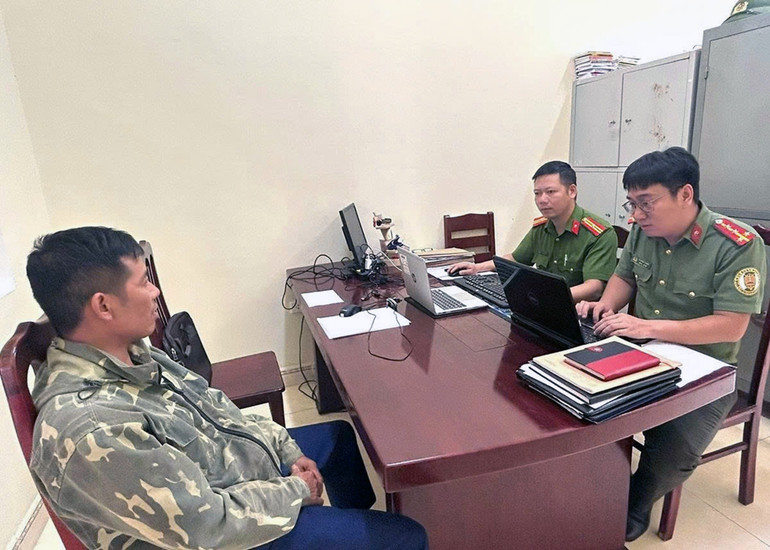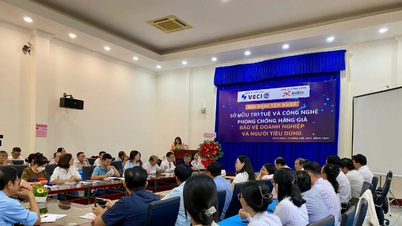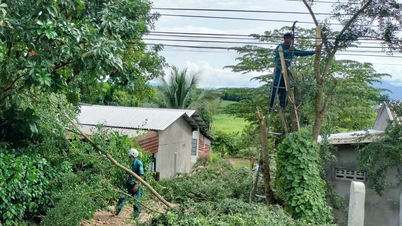
Many "tricks" using digital technology
The police of Hoa Xuan ward (Da Nang city) have just successfully rescued a male student who was threatened by subjects impersonating police and prosecutors, leading to panic. Before that, the police officers of the ward received a report from a woman that her younger brother, a first-year student, was acting abnormally, suspected of being scammed over the phone.
Immediately, the ward police force stepped in to verify and discovered that the male student was alone in a motel room on Pham Hung Street. At the time of discovery, the victim was very panicked and made a video call as instructed by online scammers. Specifically, the subjects impersonated police officers and threatened the victim that he was involved in a money laundering and drug trafficking case and asked him to find a quiet place to call Zalo, Zoom to provide personal information, bank account to serve the investigation... By professional measures, the police officers promptly discovered and helped the male student stabilize his mentality so that he could clearly realize that he was a victim of "online kidnapping".
Not only threatening victims while participating in drug and human trafficking cases, many subjects also use the trick of "online kidnapping" in the form of fake announcements of international study abroad scholarships. The reason is that many high school seniors and final year students want to find opportunities to study abroad with scholarships from 30% to 70%, even full scholarships. Grasping this trend, the subjects have come up with scenarios to scam students in need.
T, a 12th grade student at a high school in Ho Chi Minh City, shared that in late October, he was lured into participating in the "UK Study Abroad Scholarship Program" with a full scholarship package. The consultant also introduced that when participating, T students would receive free training in English at level B2 of the European framework. If they study well, the unit will support them to study for a doctorate and have the opportunity to become British citizens... To participate and "reserve a spot", T's family had to pay the initial application completion fee of 30 million. Trusting, T's family transferred the above amount to a personal account provided by the study abroad consultant. However, after transferring the money, the consultant's phone numbers and zalo were all blocked, and even his personal Facebook was deleted.
To lure students into the trap of study abroad programs, the subjects often draw up "sweet" scenarios to manipulate their psychology about international schools, tuition and living policies abroad; benefits and jobs after graduation. The important thing is that many programs provide free support during the study process. When students are "drunk" in their dreams of studying abroad, the subjects will move towards asking for proof of financial resources. More daringly, the subjects also "incite" young people to open their family safes, sell gold and dollars to deposit into the accounts provided by the subjects to receive scholarships soon. If the students do not agree, they will threaten that the money and jewelry are related to drug cases... If you want your parents and relatives to be safe and not be prosecuted, quickly transfer money to the subjects. In particular, before carrying out the "spinning" scam, the subjects lured the victims to deserted places, even to motels and hotels, and communicated via zalo and zoom to listen to instructions and follow them...
Regarding this issue, the Hanoi City Police Department also pointed out that the "online kidnapping" scam scenario, regardless of its form, usually goes through five steps, including: Collecting personal information; psychological attack; isolating the victim; appropriating property and erasing traces. During the scam, the subjects often wear uniforms impersonating agencies such as the police, prosecutor's office, court and use AI and Deepface technology to create voices and faces; create fake evidence such as minutes, summons, etc.

on cyberspace. Photo: Thang Chung
Expanding propaganda work
According to a police officer in Hanoi, in the past, scammers often used the trick of impersonating police officers or court officials to call and threaten victims involved in money laundering, drug trafficking, human trafficking, etc., and asked them to transfer money to their accounts to avoid investigation. However, in recent months, scammers often used the trick of "online kidnapping", impersonating police officers and calling directly to students involved in serious cases. After that, the subjects would guide the victims to secret places, such as motels and hotels, and ask them to cut off all contact, threatening to keep it a secret from their families. At the same time, they would instruct the victims to create signs of assault on their bodies and make calls to their relatives to report being kidnapped.
To gain the victim's trust and quickly send the ransom, the subjects often force the victim to send pictures of themselves being kidnapped, threaten to cut off fingers, and post sensitive pictures and clips of the victim online. After the victim's family transfers the ransom, the subjects cut off contact, leaving the victim in a panic in a deserted place.
According to Dr. Ha My Hanh, Head of the Department of Political Science and Educational Psychology, Tan Trao University, Tuyen Quang Province, students are now accessing social networks at an earlier age, which puts them at high risk of being scammed, bullied and even threatened in cyberspace. A typical example is the phenomenon of "online kidnapping" - a term used to refer to the act of deceiving, seducing or threatening to force students to do as the bad guys ask, with the ultimate goal of demanding ransom or seizing family property.
Dr. Ha My Hanh further analyzed that cybercriminals often take advantage of the naive and gullible psychology of students to commit their crimes. They approach through popular platforms such as Facebook, Zalo, TikTok, and even through online learning applications. Initially, they build trust by impersonating friends, teachers, relatives, or government officials. Then, using many sophisticated tricks such as cropping images, impersonating voices, and sending staged videos showing the victim being kidnapped, the subjects make parents and relatives panic and quickly transfer money as requested.
“Students often lack the skills to react in emergency situations and are easily manipulated, especially when they hear threats such as 'they will be harmed', 'they will post bad pictures', or 'call their parents to ask for money'. In a state of fear, many students unintentionally provide personal information, relatives' phone numbers, and even carry out the requests of bad guys,” Dr. Ha My Hanh shared.
Lieutenant Colonel Phi Duc Hoa, Deputy Head of the Cyber Security and High-Tech Crime Prevention Department, Tuyen Quang Provincial Police, said that recently, the Provincial Police have proactively coordinated to organize many extensive propaganda campaigns, campaigns such as "Not alone - Safe online" to raise awareness among people, especially at the grassroots level...
Tuyen Quang Provincial Police recommends: police agencies, prosecutors or courts do not work or investigate cases via phone or social networks, such as: Zalo, Viber, Facebook... All investigation activities of cases are carried out at police agencies, prosecutors and courts. To protect personal information, avoid being taken advantage of by scammers, people absolutely do not provide bank accounts, portraits, citizen identification cards via phone or social networks. Always keep information connected and do not isolate yourself from family and relatives.
The police also noted that parents need to be vigilant against unusual requests for money from their children via text messages or social networks, especially when the content shows "urgency" or "confidentiality". When receiving notifications about scholarships, admission to study abroad, international enrollment, it is necessary to check the authenticity with the school, education management agency, and not rush to transfer money based only on the consultant's promise "to return the money after verification". In case of receiving information about a relative being kidnapped, requesting to transfer "ransom" money, it is necessary to stay calm, verify the information, and immediately notify the police agency for assistance instructions.
Source: https://nhandan.vn/tai-dien-tinh-trang-lua-dao-chiem-doat-tai-san-duoi-hinh-thuc-bat-coc-online-post920991.html






![[Photo] Closing of the 14th Conference of the 13th Party Central Committee](https://vphoto.vietnam.vn/thumb/1200x675/vietnam/resource/IMAGE/2025/11/06/1762404919012_a1-bnd-5975-5183-jpg.webp)































































































Comment (0)